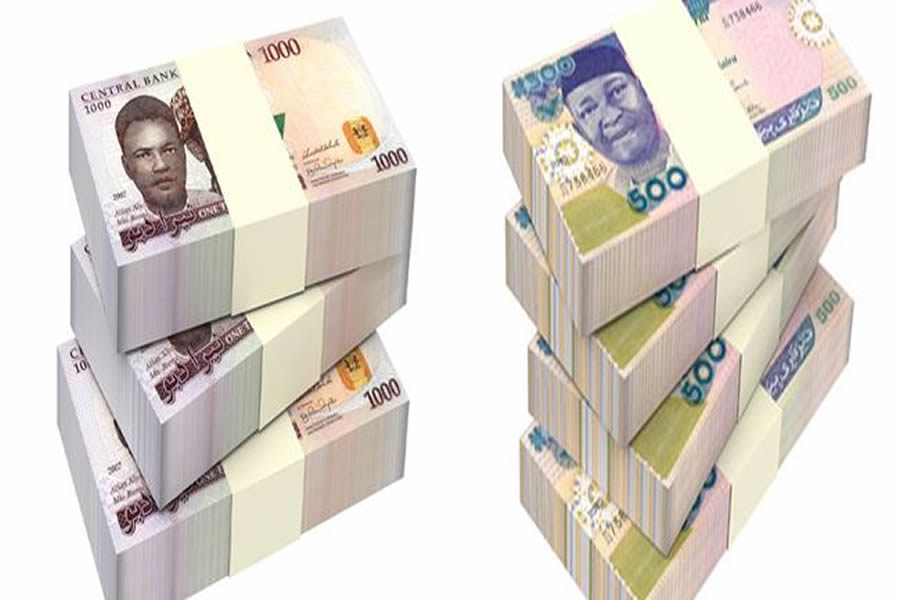Nigeria’s local currency unit is set to weaken further next year as its current exchange rate to the dollar is well above fair value, the Bank of America (BofA) has said.
BofA economist, Tatonga Rusike, in a note to clients yesterday said the forecast based on three indicators – the widely-used black-market rate, the central bank’s real effective exchange rate, and “our own currency fair value analysis” – show that the naira is 20 per cent overvalued.
“We see scope for it to weaken by an equivalent amount over the next six-nine months, taking it to as high as N520 per USD,” Rusike said.
While the naira will come under increasing pressure “due to limited government external borrowing,” devaluation is unlikely to happen until after the February 2023 presidential elections, the bank said.
Nigeria operates a multiple exchange regime dominated by a tightly controlled official exchange rate and a parallel market where the currency is freely traded.
The naira exchanged at N440.95 to the dollar in the official spot market as of 12.15pm and about N731.46 in the parallel market, according to @naira_rates, a Twitter account that tracks the black market.
The official rate has depreciated by less than 10 per cent since December 2021 even as the parallel rate is down by nearly a third within the same period, widening the gap to almost 70 per cent, BofA analysis showed.
“The greater the disparity with the official market, the higher the likelihood of increasing excess demand for foreign currency on the parallel market,” the bank said.
Analysts have expressed concerns about the impact of the elections on the value of the Naira to the USD in 2023.
In May during the party primaries, demand for the dollar at both official and black markets rose to new heights as politicians mopped up the greenback for electioneering campaigns.
The uptick in dollar demand has led to depreciation of the naira, which closed at over N600/$1 at the parallel market .
Analysts warned that rising demands for foreign exchange could throw the naira exchange rate out of equilibrium. Such an adverse scenario must be prevented through proactive monetary policy.
The chief executive officer, Centre for the Promotion of Private Enterprise (CPPE), Dr Muda Yusuf, said, “What is needed at this time is a fundamental reform of the foreign exchange ecosystem.”
According to him, the current forex policy has created enormous distortions which need to be fixed as a matter of priority, adding that the unprecedented gap between the official exchange rate and open market rate is hurting the economy and crippling investment.
“We need to move quickly to reduce this premium. This is a more important conversation than the view of the Bank of America on our exchange rate,” he explained.
On his part, the managing director, Morgan Capital Securities Limited and an economic analyst, Rotimi Olubi, said electioneering for 2023 general elections will further increase foreign portfolio outflows and cause Foreign Portfolio Investors (FPIs) to remain on the sidelines.
He listed other factors expected to cause further outflow, including rate hikes and capital controls by the monetary authorities.
Olubi added that the foreign exchange would likely come under strong pressure as interest rate hikes in advanced economies would result in portfolio outflows from emerging markets.
Head of Financial Institutions’ Ratings, Agusto & Co, Mr. Ayokunle Olubunmi, noted that “what we are seeing is not different; it is something we see every election cycle. First of all, the election period is always characterised by a lot of demand for FX because wanting to give someone N100 million is very difficult in naira but if I just have it in dollars, it is easier.
Olubunmi noted that in the coming months, the election industry will continue to boom while the other sectors of the economy not related to elections will take the back seat in terms of growth.
For the economy in general, he said “there is something you can call the election-related industry, so things like printing, advertising, and all those areas will actually be recording a boom now.
“For the economy generally, it is not like 2019 when we knew the president is likely to come back; now there would be a new president in 2023 and we don’t know the person or his stance on the economy. So, most businesses are waiting and nobody is talking about expansion. So, most businesses are not in an expansionary mode. So, there would be a slowdown in the business activities in the economy except for businesses that are election-related and businesses that are resilient like banking,” he said.
Leadership

